Engine Replacement Automatic Transmission
Removal Procedure
- Disconnect the negative battery cable. Refer to Battery Negative Cable Disconnection and Connection in Engine Electrical.
- Remove the hood. Refer to Hood Replacement in Body Front End.
- Drain the cooling system. Refer to Cooling System Draining and Filling in Engine Cooling.
- Recover the A/C system. Refer to Refrigerant Recovery and Recharging in Heating, Ventilation and Air Conditioning.
- Remove the air inlet duct and resonator assembly. Refer to Air Cleaner Outlet Resonator Replacement in Engine Controls-2.2L.
- Disconnect the brake booster vacuum line at the intake manifold.
- Remove the resonator bracket/fuel rail cover.
- Remove the accelerator (1) and the cruise control (2) cables from the cable bracket. Refer to Accelerator Control Cable Bracket Replacement in Engine Controls-2.2L.
- Disconnect the engine wiring harness from the underhood engine components .
- Remove the cruise control module. Refer to Cruise Control Module Replacement in Cruise Control.
- Disconnect the A/C line from the accumulator. Refer to Air Conditioning Accumulator Replacement in Heating, Ventilation and Air Conditioning.
- Remove the drive belt. Refer to Drive Belt Replacement .
- Remove the surge tank. Refer to Radiator Surge Tank Replacement in Engine Cooling.
- Remove power steering pump from the accessory bracket. Refer to Power Steering Pump Replacement in Power Steering System.
- Remove the upper and the lower radiator hoses. Refer to Radiator Inlet Hose Replacement and Radiator Outlet Hose Replacement in Engine Cooling.
- Remove heater hoses from engine. Refer to Heater Inlet Hose Replacement and to Heater Outlet Hose Replacement in Heating, Ventilation and Air Conditioning.
- Remove the fuel feed lines at the engine. Refer to Fuel Hose/Pipes Replacement - Engine Compartment in Engine Controls-2.2L.
- Raise and support the vehicle. Refer to Lifting and Jacking the Vehicle in General Information.
- Remove the right side wheel and tire assembly. Refer to Tire and Wheel Removal and Installation in Tires and Wheels.
- Remove the right engine splash shield. Refer to Engine Splash Shield Replacement in Body Front End.
- Remove the engine mount strut. Refer to Engine Mount Strut Replacement .
- Remove the flywheel inspection cover.
- Remove the starter. Refer to Starter Motor Replacement in Engine Electrical.
- Remove the exhaust pipe and hanger from the exhaust manifold. Refer to Catalytic Converter Replacement in Engine Exhaust.
- Remove and support the A/C compressor. Refer to Air Conditioning Compressor Replacement in Heating, Ventilation and Air Conditioning.
- Remove the A/C compressor bracket. Refer to Compressor Mounting Bracket Replacement in Heating, Ventilation and Air Conditioning.
- Drain the engine oil. Refer to Engine Oil and Oil Filter Replacement .
- Remove the torque converter bolts.
- Remove the brace between the transmission and the engine support.
- Remove the bolts which secure the lower transmission to the engine.
- Lower the vehicle.
- Support the transmission with a suitable jack.
- Install the engine lifting device to the engine lifting eyes.
- Remove the engine mount. Refer to Engine Mount Replacement in Engine Mechanical.
- Remove the remaining bolts which secure the transmission to the engine.
- Separate the engine from the transmission and lift the engine from the vehicle.
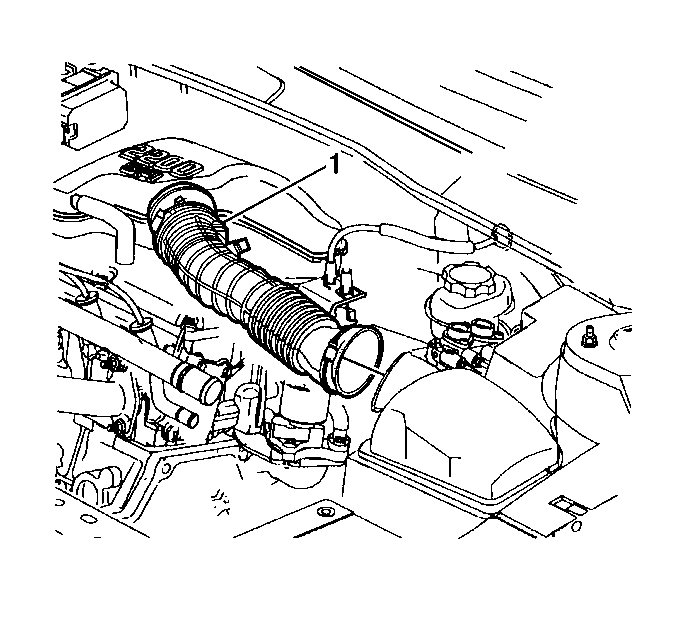
Caution: In order to avoid possible injury or vehicle damage, always replace the accelerator control cable with a NEW cable whenever you remove the engine from the vehicle.
In order to avoid cruise control cable damage, position the cable out of the way while you remove or install the engine. Do not pry or lean against the cruise control cable and do not kink the cable. You must replace a damaged cable.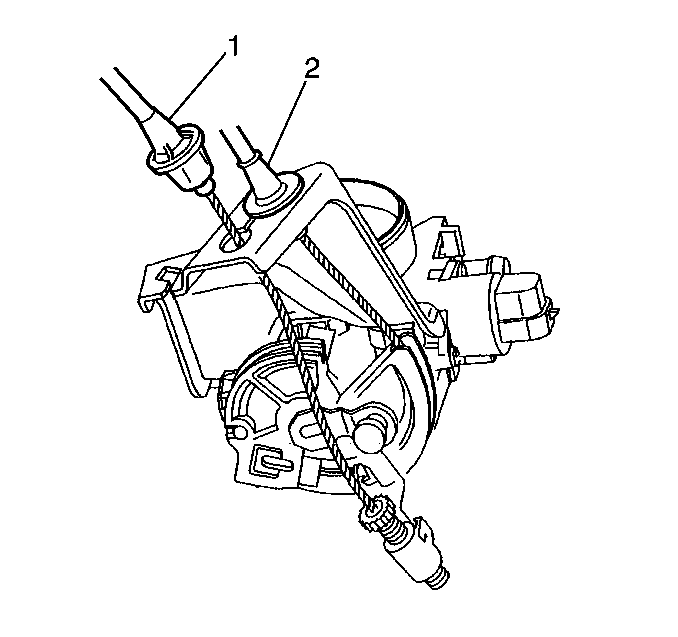


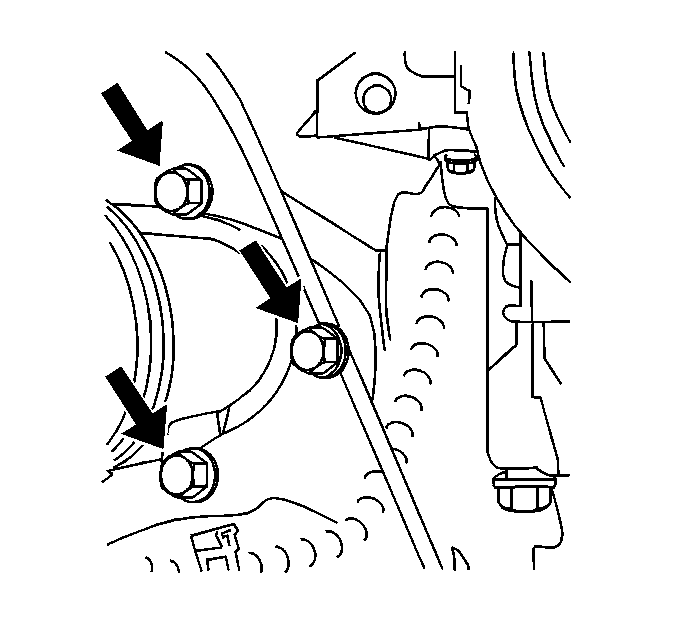
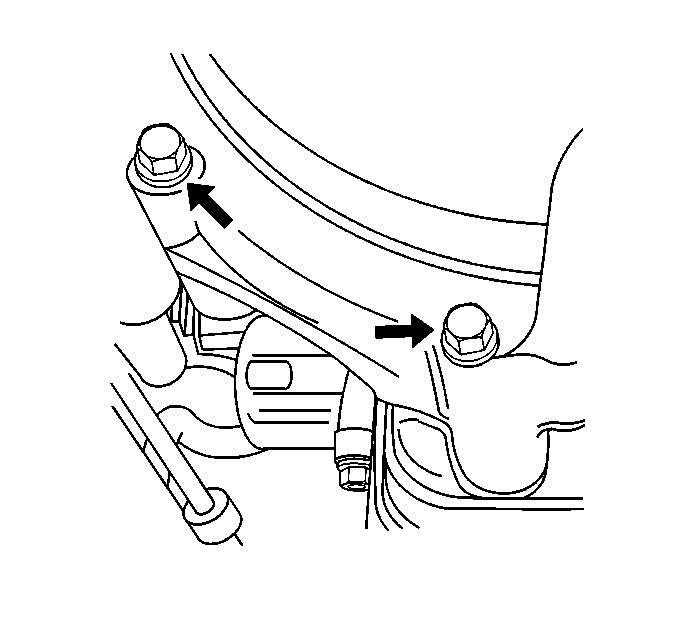
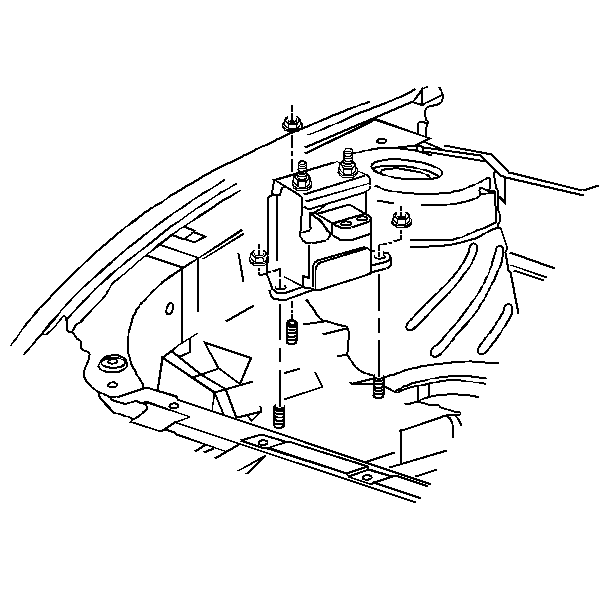
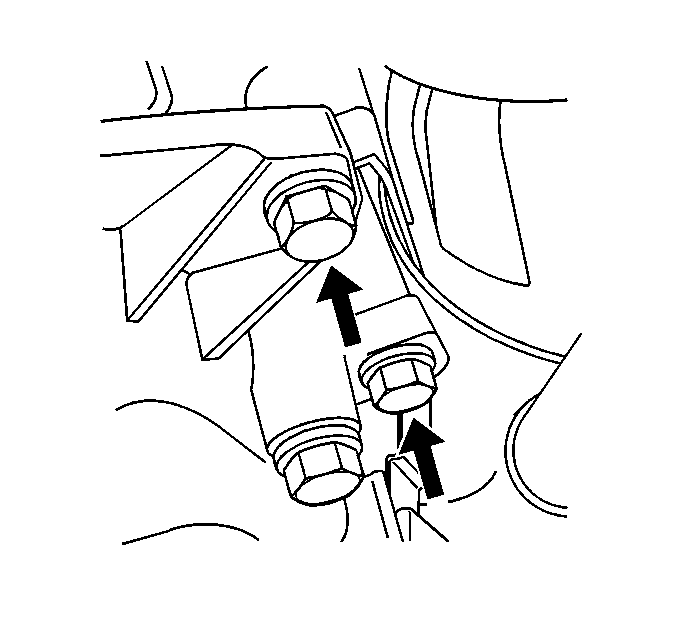
Installation Procedure
- Position the engine in the vehicle.
- Install the upper transmission to engine bolts.
- Install the engine mount. Refer to Engine Mount Replacement .
- Remove the engine lifting device from the lifting eyes.
- Remove the jack supporting the transmission.
- Raise the vehicle.
- Install the bolts which secure the lower transmission to the engine.
- Install the brace between the lower transmission and the engine.
- Install the torque converter bolts.
- Install the A/C compressor bracket. Refer to Compressor Mounting Bracket Replacement in Heating,Ventilation and Air Conditioning.
- Install the A/C compressor. Refer to Air Conditioning Compressor Replacement in Heating, Ventilation and Air Conditioning.
- Install the starter. Refer to Starter Motor Replacement in Engine Electrical.
- Install the exhaust pipe and hanger to the exhaust manifold. Refer to Catalytic Converter Replacement in Engine Exhaust.
- Install the flywheel Inspection cover.
- Install the engine mount strut. Refer to Engine Mount Strut Replacement .
- Install the right engine splash shield. Refer to Engine Splash Shield Replacement in Body Front End.
- Install the right side wheel and tire assembly. Refer to Tire and Wheel Removal and Installation in Tires and Wheels.
- Lower the vehicle.
- Install the fuel feed lines at the engine. Refer to Fuel Hose/Pipes Replacement - Engine Compartment in Engine Controls-2.2L.
- Connect the upper and lower radiator hoses. Refer to Radiator Inlet Hose Replacement and Radiator Outlet Hose Replacement in Engine Cooling.
- Install the heater hoses to the engine. Refer to Heater Inlet Hose Replacement and to Heater Outlet Hose Replacement in Heating, Ventilation and Air Conditioning.
- Install the surge tank. Refer to Radiator Surge Tank Replacement in Engine Cooling.
- Install the resonator bracket/fuel rail cover.
- Install power steering pump to the accessory bracket. Refer to Power Steering Pump Replacement in Power Steering System.
- Install the drive belt. Refer to Drive Belt Replacement .
- Connect the A/C line to the accumulator. Refer to Air Conditioning Accumulator Replacement in Heating, Ventilation and Air Conditioning.
- Install the cruise control module. Refer to Cruise Control Module Replacement in Cruise Control.
- Install the engine wiring harness.
- Install the accelerator and the cruise control cable. Refer to Accelerator Control Cable Bracket Replacement in Engine Controls-2.2L.
- Connect the brake booster vacuum line at the manifold.
- Install the air inlet duct and resonator assembly. Refer to Air Cleaner Outlet Resonator Replacement in Engine Controls-2.2L.
- Fill the cooling system. Refer to Cooling System Draining and Filling in Engine Cooling.
- Recharge the A/C system. Refer to Refrigerant Recovery and Recharging in Heating, Ventilation and Air Conditioning.
- Install the hood. Refer to Hood Replacement in Body Front End.
- Connect the battery cable. Refer to Battery Negative Cable Disconnection and Connection in Engine Electrical.
- Start the engine and check for leaks.
- Inspect all fluid levels.
Notice: Use the correct fastener in the correct location. Replacement fasteners must be the correct part number for that application. Fasteners requiring replacement or fasteners requiring the use of thread locking compound or sealant are identified in the service procedure. Do not use paints, lubricants, or corrosion inhibitors on fasteners or fastener joint surfaces unless specified. These coatings affect fastener torque and joint clamping force and may damage the fastener. Use the correct tightening sequence and specifications when installing fasteners in order to avoid damage to parts and systems.

Tighten
Tighten the bolts to 75 N·m (55 lb ft).


Tighten
Tighten the bolts to 75 N·m (55 lb ft).


Tighten
Tighten the bolts to 62 N·m (46 lb ft).


Caution: In order to avoid possible injury or vehicle damage, always replace the accelerator control cable with a NEW cable whenever you remove the engine from the vehicle.
In order to avoid cruise control cable damage, position the cable out of the way while you remove or install the engine. Do not pry or lean against the cruise control cable and do not kink the cable. You must replace a damaged cable.Engine Replacement Manual Transmission
Removal Procedure
- Disconnect the negative battery cable. Refer to Battery Negative Cable Disconnection and Connection in Engine Electrical.
- Relieve the fuel system pressure. Refer to Fuel Pressure Relief in Engine Controls-2.2L.
- Drain the cooling system. Refer to Cooling System Draining and Filling in Engine Cooling.
- Remove the air cleaner outlet duct (1) and resonator assembly. Refer to Air Cleaner Outlet Resonator Replacement in Engine Controls-2.2L.
- Remove the upper and lower radiator hoses from engine. Refer to Radiator Inlet Hose Replacement and Radiator Outlet Hose Replacement in Engine Cooling.
- Disconnect the brake booster vacuum hose.
- Disconnect the IAC electrical connection.
- Disconnect the generator electrical connections.
- Disconnect the throttle position (TPS) sensor electrical sensor.
- Disconnect the MAP electrical connection.
- Disconnect the EVAP emission solenoid electrical connection.
- Disconnect the injector harness electrical connections.
- Remove the following cables from the accelerator control bracket:
- Disconnect the engine coolant temperature (ECT) sensor electrical connection.
- Disconnect the Oxygen (O2S) sensor electrical connection.
- Disconnect ignition control module connectors.
- Disconnect the engine grounds electrical connection.
- Remove the drive belt. Refer to Drive Belt Replacement .
- Disconnect the transmission shift control cable from the lever and from the bracket.
- Disconnect hydraulic clutch line.
- Remove the coolant surge tank. Refer to Radiator Surge Tank Replacement in Engine Cooling.
- Disconnect the vacuum line near the master cylinder.
- Raise the vehicle. Refer to Lifting and Jacking the Vehicle in General Information.
- Remove the suspension support frame. Refer to Front Suspension Crossmember Replacement in Front Suspension.
- Disconnect the A/C compressor electrical connector.
- Remove the A/C compressor and support the compressor with the lines attached. Refer to Air Conditioning Compressor Replacement in Heating, Ventilation and Air Conditioning.
- Disconnect the electrical connection from the vehicle speed sensor.
- Remove the starter. Refer to Starter Motor Replacement in Engine Electrical.
- Disconnect the electrical connector from the oil pressure sensor.
- Disconnect the ground wires.
- Remove both of the drive axles from the transmission and position the axles aside. Refer to Wheel Drive Shaft Replacement in Wheel Drive Shafts.
- Lower the vehicle until the engine/transmission assembly is on the support table.
- Disconnect the heater hoses at the front of the dash. Refer to Heater Inlet Hose Replacement and to Heater Outlet Hose Replacement in Heating,Ventilation and Air Conditioning.
- Disconnect the fuel lines. Refer to Fuel Hose/Pipes Replacement - Engine Compartment in Engine Controls-2.2L.
- Remove the transmission mount through bolts. Refer to Transmission Front Mount Replacement in Automatic Transaxle-3T40 and to Transmission Rear Mount Replacement in Manual Transmission-M86/M94 Getrag.
- Remove the engine mount assembly. Refer to Engine Mount Replacement in Engine Mechanical-2.2L.
- Raise the vehicle.
- Separate the engine from the transmission.

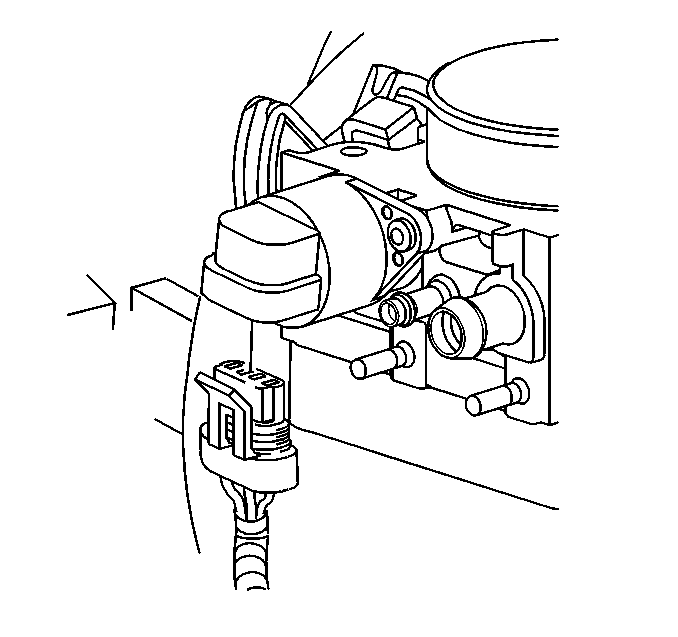
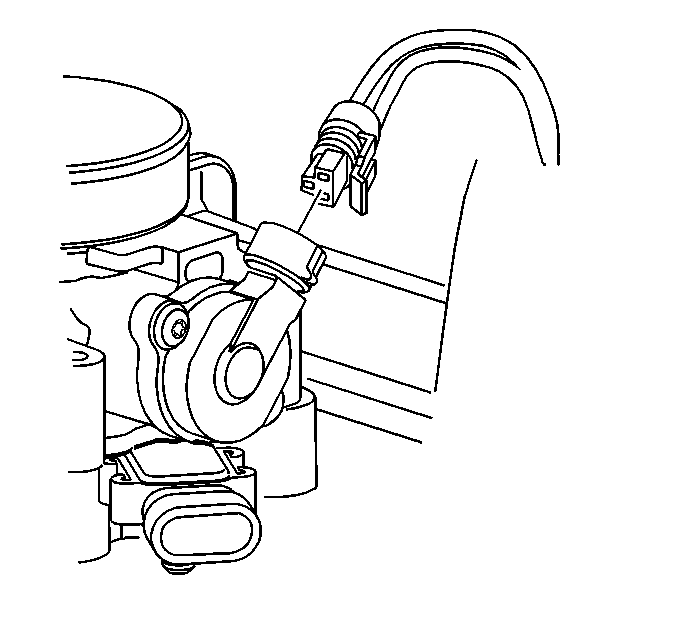
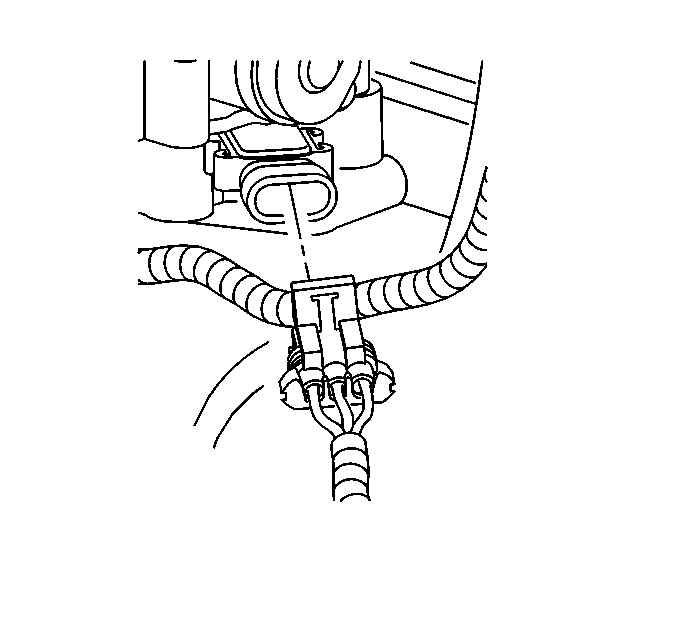

| • | The accelerator control (2) |
| • | The cruise control (1) |
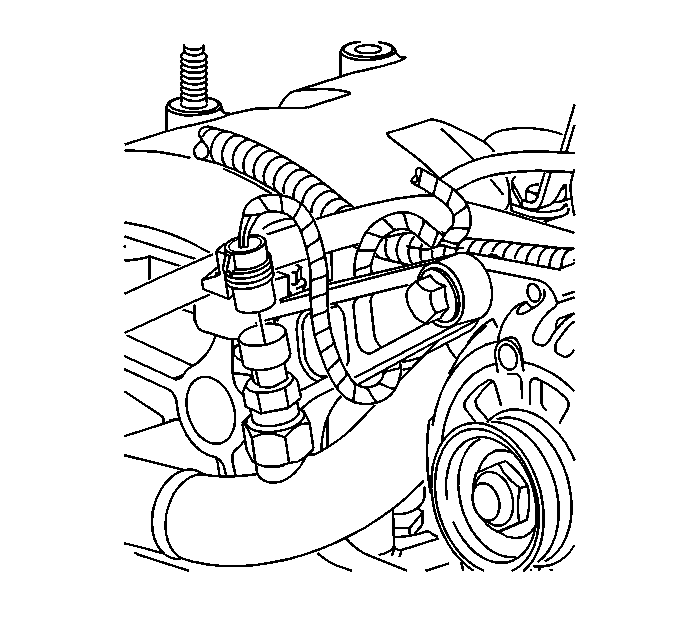
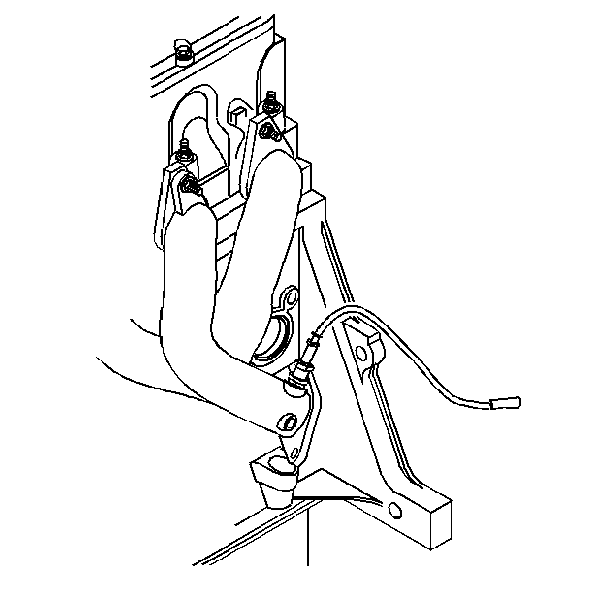
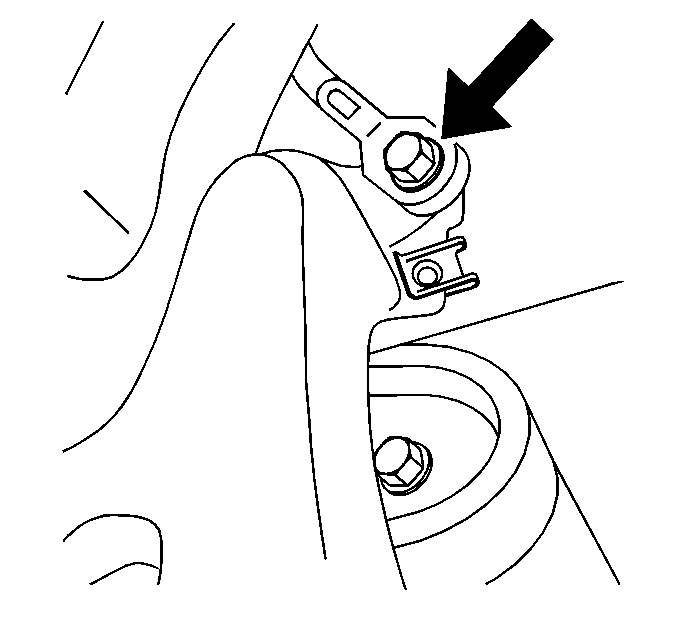

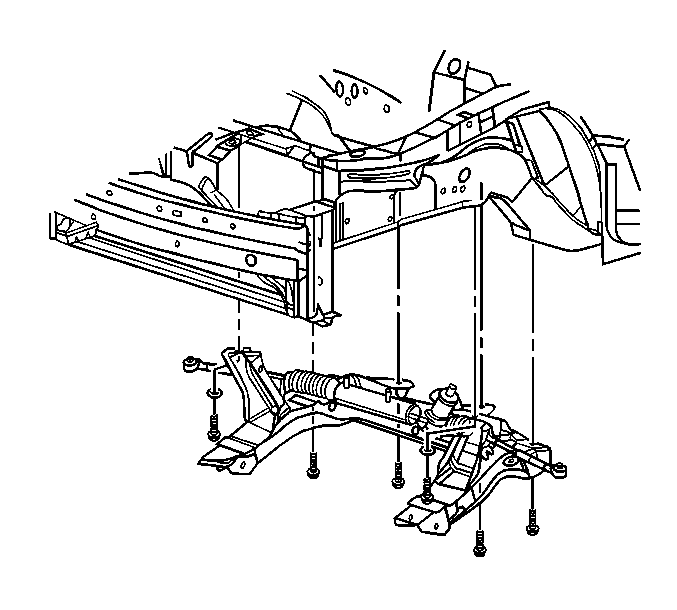

Installation Procedure
- Install the engine to the transmission.
- Install the transmission bolts.
- Lower the vehicle onto the engine and transmission assembly.
- Install the engine mount assembly. Refer to Engine Mount Replacement in Engine Mechanical-2.2L.
- Install the transmission mount through bolts. Refer to Transmission Front Mount Replacement and to Transmission Rear Mount Replacement in Manual Transmission-M86/M94 Getrag.
- Raise the vehicle from the support table.
- Install both drive axles. Refer to Wheel Drive Shaft Replacement in Wheel Drive Shafts.
- Install the suspension support frame. Refer to Front Suspension Crossmember Replacement in Front Suspension.
- Install the starter. Refer to Starter Motor Replacement in Engine Electrical.
- Connect the electrical connection to the oil pressure sensor.
- Connect the electrical connection to the oil level sensor.
- Connect the electrical connection to ground.
- Install the A/C compressor. Refer to Air Conditioning Compressor Replacement in Heating, Ventilation and Air Conditioning.
- Lower the vehicle.
- Connect the lower radiator hose to the coolant pump. Refer to Radiator Outlet Hose Replacement in Engine Cooling.
- Connect the heater hoses. Refer to Heater Inlet Hose Replacement and to Heater Outlet Hose Replacement in Heating, Ventilation and Air Conditioning.
- Install the following cables to the accelerator control bracket:
- Connect the electrical connection to the electronic ignition module. Refer to Ignition Control Module Replacement in Engine Controls-2.2L.
- Connect the vacuum line near the master cylinder.
- Install the coolant surge tank. Refer to Radiator Surge Tank Replacement in Engine Cooling.
- Connect the transmission shift control cables.
- Connect the hydraulic clutch line.
- Install the drive belt. Refer to Drive Belt Replacement .
- Install the IAC electrical connection.
- Connect the generator electrical connection. Refer to Generator Replacement in Engine Electrical.
- Connect the electrical connection to the TPS.
- Connect the MAP electrical connection.
- Connect the EVAP emission solenoid electrical connector.
- Connect the injector harness. Refer to Fuel Injector Replacement in Engine Controls-2.2L.
- Connect the electrical connector to the ECT sensor.
- Reconnect the O2S sensor.
- Connect the engine ground wires.
- Connect the brake booster vacuum hose.
- Install the upper radiator hose at the coolant outlet. Refer to Radiator Inlet Hose Replacement in Engine Controls-2.2L.
- Install the air cleaner inlet duct and resonator assembly. Refer to Air Cleaner Outlet Resonator Replacement in Engine Controls-2.2L.
- Fill the coolant system. Refer to Cooling System Draining and Filling in Engine Cooling.
- Refill the engine with oil. Refer to Engine Oil and Oil Filter Replacement .
- Connect the negative battery cable using the battery cable bolt.
- Connect the fuel lines. Refer to Fuel Hose/Pipes Replacement - Engine Compartment in Engine Controls-2.2L.
- Start the engine and inspect for leaks.
- Turn the engine OFF and reinspect the fluid levels.
Notice: Use the correct fastener in the correct location. Replacement fasteners must be the correct part number for that application. Fasteners requiring replacement or fasteners requiring the use of thread locking compound or sealant are identified in the service procedure. Do not use paints, lubricants, or corrosion inhibitors on fasteners or fastener joint surfaces unless specified. These coatings affect fastener torque and joint clamping force and may damage the fastener. Use the correct tightening sequence and specifications when installing fasteners in order to avoid damage to parts and systems.
Tighten
Tighten the bolts to 75 N·m (55 lb ft).

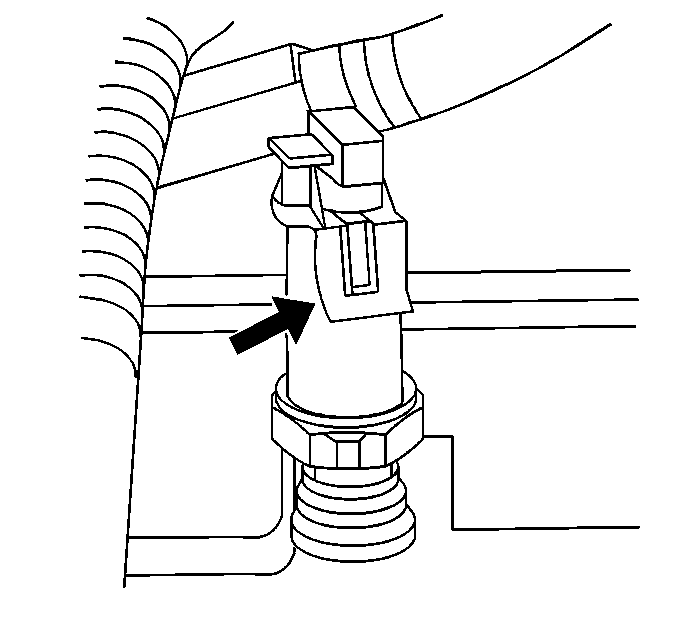

| • | The accelerator control (2) |
| • | The cruise control (1) |
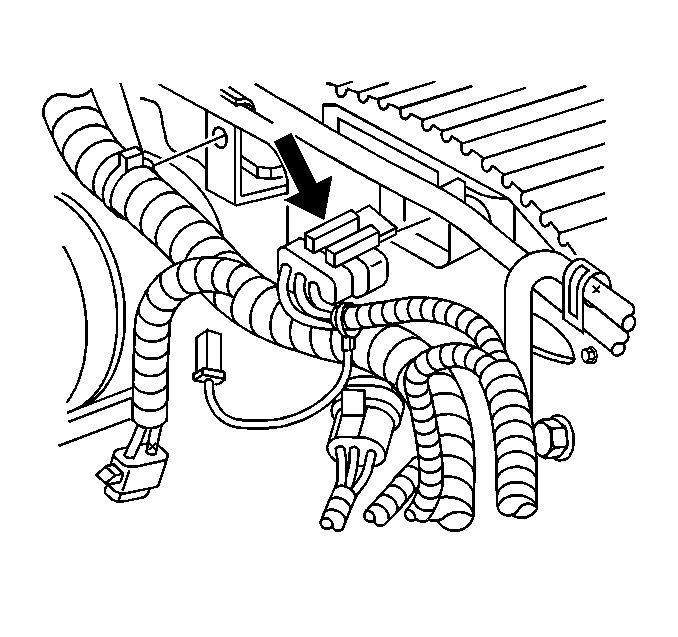



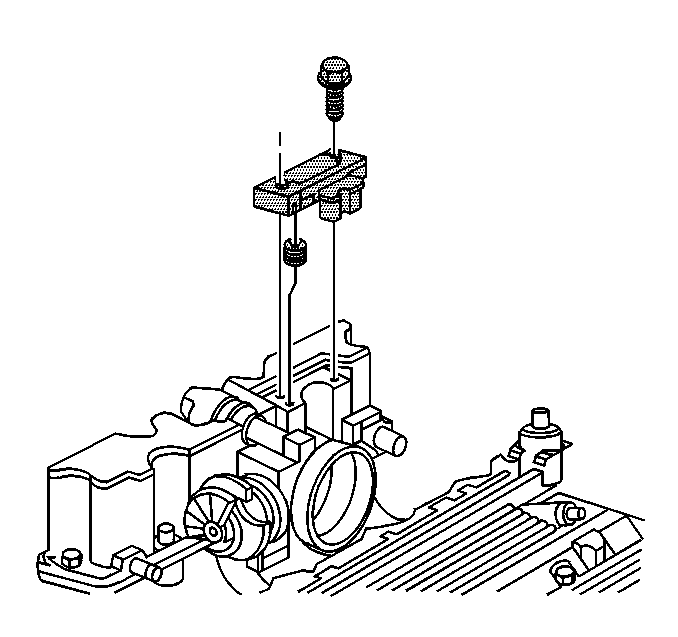


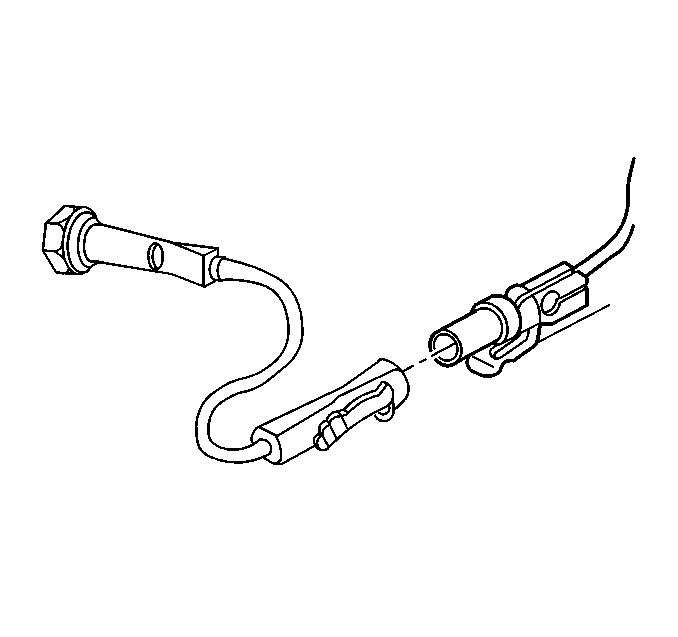

Tighten
Tighten the bolt to 16 N·m (12 lb ft).
